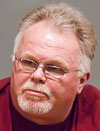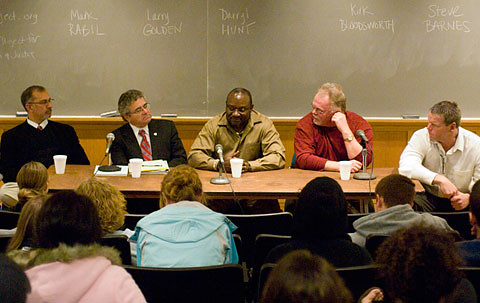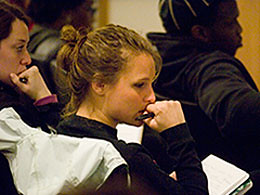
Even though it has been 17 years since Kirk Bloodsworth, wrongfully convicted and sentenced to death for rape and murder, was freed from the confinement of a jail cell, the memories of his incarceration still haunt him.
“It’s a constant struggle. You never escape the pain of being locked up for a crime you had nothing to do with,” said Bloodsworth, fighting back tears as he recounted those dark days in prison and answered students’ questions during an emotional discussion Monday in Persson Auditorium, part of a three-day symposium about wrongful convictions.
Joining Bloodsworth at ĎăĂŰÓ°ĘÓ were Darryl Hunt and Steven Barnes, who both were also exonerated after spending decades behind bars for rapes and murders they did not commit.
 |
| Speaking at the symposium were (left to right): attorneys Mark Rabil and Larry Golden, and Darryl Hunt, Kirk Bloodsworth, and Steven Barnes, who were all wrongfully convicted of crimes. (Photo by Luke Connolly ’09) |
“We are proof that there are flaws in the criminal justice system,” said Hunt, a soft-spoken, deeply religious man who credits his faith with helping him get through 19 years in prison — four of those in solitary confinement.
“You must always question what you are told by looking beyond the surface. Just because a person in an authoritative position says something is fact does not mean it is true.”
All three men were eventually exonerated based on advanced DNA testing, which was unavailable at the time of their trials. However, it was not DNA alone that cleared their names, as Hunt’s attorney, Mark Rabil, who also visited campus, explained.
“The cases were kept alive because these three men were determined to see justice prevail,” said Rabil.
To date, 235 prisoners have been exonerated, primarily through DNA.
Adjusting to life outside prison walls is not always easy. The exonerated men pointed out the barriers to successfully re-entering society, including societal prejudice against ex-offenders and minimal education and job skills.
 |
| Students at the symposium listen to the stories of three men wrongfully convicted of crimes. (Photo by Luke Connolly ’09) |
“How do you explain a 20-year employment gap in your resume? Even though I’ve been exonerated, there’s still a stigma associated with my past,” said Hunt.
Despite his struggles, Hunt does not harbor any anger. “I’ve learned to let it go because I want to live the rest of my life to the fullest. Bitterness and hatred can eat you up on the inside.”
The symposium, sponsored by the Department of Sociology and Anthropology, also included a brown bag lunch about the impact of incarcerations on families, a lecture about race and wrongful convictions, and a film screening of The Trials of Darryl Hunt, an HBO documentary chronicling Hunt’s story.
The events served as a learning tool for students who are studying related topics in courses taught by Earl Smith, Arnold A. Sio Visiting Professor of Diversity and Community, and Angela Hattery, A. Lindsay O’Connor Professor of American Institutions.
“Speaking with the men in person brought to life the issues that we’ve been studying about in class,” said Kelsey OYong ’09. “Their stories highlight the importance of cherishing our freedom because it can be taken away, even from innocent people.”